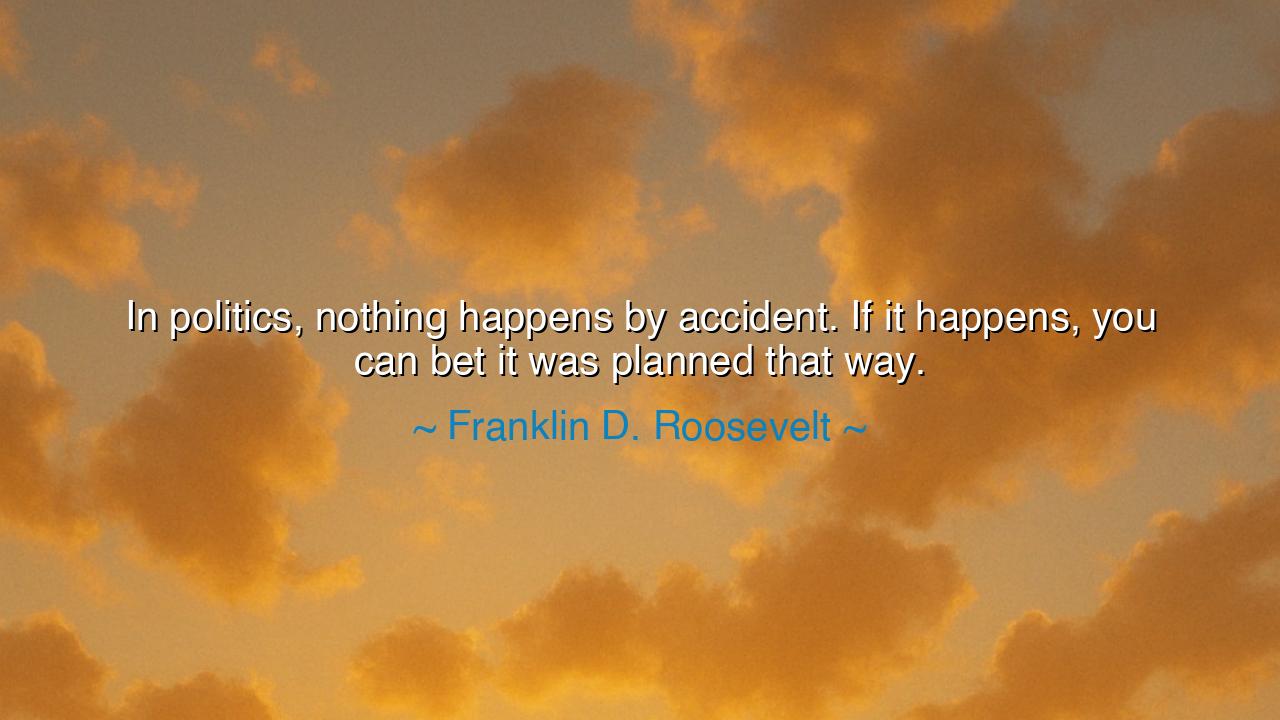
In politics, nothing happens by accident. If it happens, you can
In politics, nothing happens by accident. If it happens, you can bet it was planned that way.






The words of Franklin D. Roosevelt resound like a warning bell through the corridors of time: “In politics, nothing happens by accident. If it happens, you can bet it was planned that way.” This utterance is no idle phrase, but a revelation of how power moves beneath the surface. To the unwise, events may appear as chance, as scattered dust carried by the wind. But to those who know the hidden hand of governance, every shift, every decree, every war or treaty bears the mark of design. In the realm of politics, chaos is but a mask for intention.
The ancients, too, knew this truth. The emperors of Rome did not rise by fortune alone; they schemed with allies, silenced rivals, and bent the Senate to their will. When Caesar crossed the Rubicon, was it a reckless leap? No—it was a calculated act, born of long deliberation and cunning foresight. So too does Roosevelt remind us: what appears sudden is in truth the flowering of seeds sown long before. In the heart of power, chance is but a word for hidden preparation.
Consider the story of World War II itself. Roosevelt, with eyes set beyond the present, prepared his nation for the storm. While many in America clung to isolation, he strengthened the navy, drafted secret agreements, and laid the foundations of the Lend-Lease Act. When the day of reckoning came, it seemed as if the United States leapt suddenly into the fray. But those who study history know it was no accident—every move was planned, every step foreseen. Thus the nation stood ready, not by fortune, but by design.
This teaching is both a warning and a guide. It warns us not to be naïve, thinking that the rise of rulers, the fall of empires, or the making of laws are born from coincidence. They are crafted, often in the shadows, by minds who weave strategies as spiders spin webs. Yet it also guides us: if nothing is by accident, then the wise must learn to read the patterns, to uncover the purposes hidden beneath the surface, to see the plan before it is revealed.
Let the generations remember: when they behold a sudden war, an unexpected law, a leader who rises as though from nowhere—ask not, “How did this happen?” but “Who planned it so?” For in the realm of politics, chance is but illusion. To know this truth is to walk with open eyes in a world where many still sleep.






UGUser Google
Roosevelt’s statement that nothing happens in politics by accident makes me think about how much of politics is influenced by hidden agendas. Are political events always part of a larger strategy, or can they sometimes result from spontaneous decisions and unforeseen factors? While I can see the validity of his view in certain circumstances, it also feels like it could undermine the role of chance and human error in political developments.
HAHoang Ha Anh
I find Roosevelt’s quote about political events being planned intriguing, but it also makes me wonder about the implications of such a view. If everything is planned, where does that leave the average citizen? Does it mean that political outcomes are inevitable, regardless of public opinion or participation? This idea raises questions about the real power dynamics at play and whether transparency is sacrificed for strategic planning in politics.
TNThao Nguyen
Roosevelt’s idea that everything in politics is planned brings up an important concern about power and control. If all political events are carefully planned, does it mean that the general public has less influence on decision-making? How do we reconcile this with the notion of democracy, where citizens are supposed to have a voice in shaping political outcomes? Is this planning ultimately beneficial or detrimental to the public’s trust in the system?
XGkly xing gai
Franklin D. Roosevelt’s quote about politics being deliberate and planned raises an interesting perspective. It suggests that every move in politics is calculated, which can make us question the transparency and accountability of political decisions. But is it possible that some political events occur by chance, or do we tend to overlook the behind-the-scenes factors that shape them? How much of politics is truly orchestrated versus reactive to unexpected circumstances?